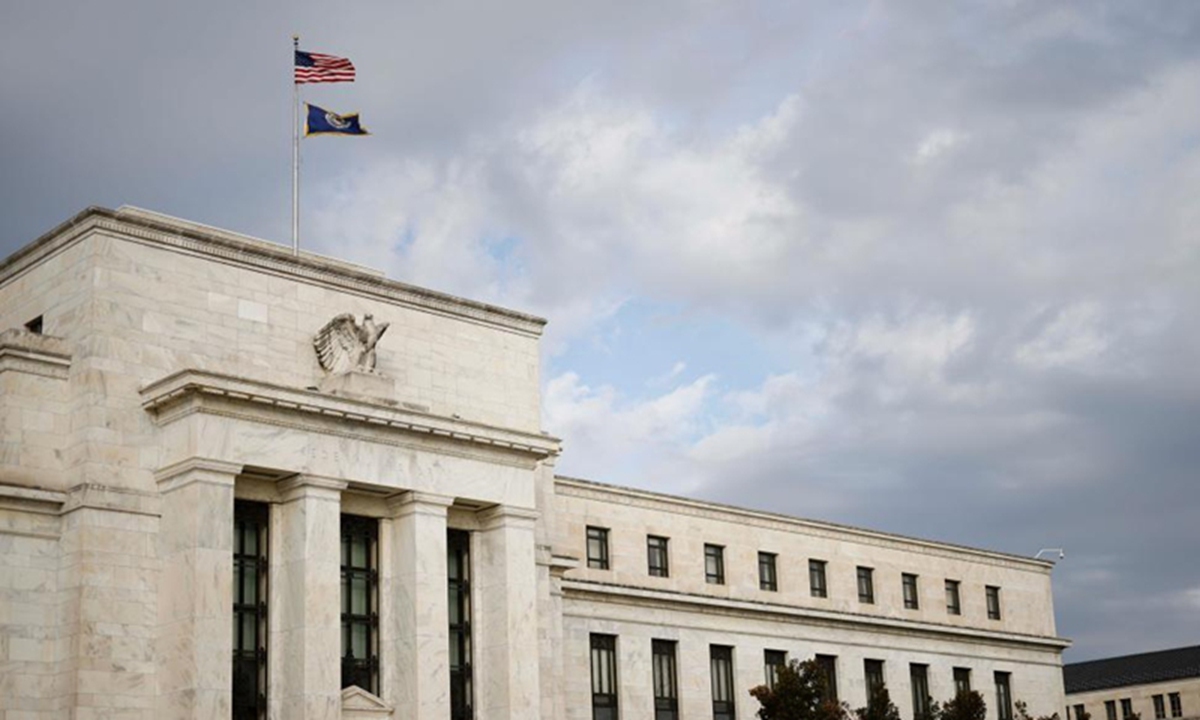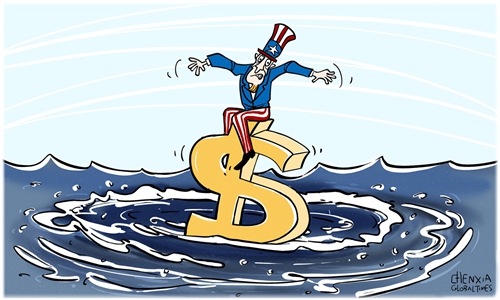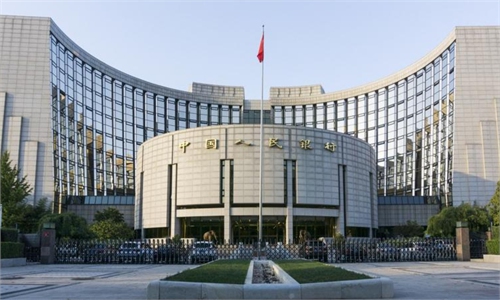
The US Federal Reserve in Washington, D.C., the US Photo: Xinhua
The world's capital market landscape looks increasingly volatile and tumultuous this week, primarily caused by the sudden tick-up of unemployment rate in the US labor market. The inaction by the US Federal Reserve policymakers to adjust the interest rates in the first half of 2024 is to blame.
The US economy may have suffered an unexpected significant slowdown recently, as hiring fell sharply and the jobless rate rose for the fourth straight month in July with the Fed's sustained higher interest rates taking a toll on the economy.
As a result, the stock markets from Japan, South Korea to Europe and the US Wall Street all nosedived on Monday, as investors sold off equities, fearing the US economy - facing prolonged rigid restrictions with the Federal Reserve's 5.25-5.5 interest rates as well as over $35 trillion US federal government debt, may be on the verge of a precipice.
Friday's report from the US Labor Department showed that American employers added just 114,000 jobs in July - 35 percent fewer than the market had expected. The bleak employment report on Friday, revealing the US jobless rate surged to 4.3 percent in July from 4.1 percent a month ago, triggered the "Sahm Rule," a well-known recession indicator.
The anxiety that the world's largest economy is now embroiled in a serious slowdown or possibly recession immediately triggered a global market turmoil, with Japan's Topix stock index plunging 12.8 percent and the Dow Jones index losing 1,033.99 points or 2.6 percent on Monday. The S&P 500 index lost 3 percent, its sharpest daily decline since September 2022.
The global market rout, erasing billions of dollars in equity values, was the latest example of how a sudden surge in America's jobless rate can ricochet across the world's capital markets and cause painstaking damage to ordinary investors.
Government officials and economists all over the world have urged the Federal Reserve, the US central bank, to reduce interest rates - the sooner, the better.
But Fed policymakers have been ostensibly oblivious to the changing macro environment, refusing to take prompt action. It is illogical and insensible for the US central bank to maintain the federal funds rates at 23-year high of 5.25-5.5 percent ever since July 2023.
A normally functioning economy can hardly bear that high a rate for so long, which could easily tip the economy into a sharp slowdown or a distressful recession. When the monetary policy is kept too restrictive for too long, it will inflict unwanted damages on the economy, causing cramped business activity across the board and leading to higher unemployment rates because employers would have fewer unfilled job openings.
The US policymakers have been adamant, asserting they need to maintain elevated interest rates to stamp out "entrenched" and sticky inflation. By the second half of 2023, it was not difficult to fathom that the US inflation was trending down markedly. However, the US Fed officials did not respond to falling inflation by cutting the policy rates as they were believed to be unwilling to act until the data showed inflation was literally back to the 2-percent target the US policymakers set.
Last week after a policy meeting in Washington which saw no rate cut by the policymakers, Jerome Powell, the Fed chair, told reporters: "It's going to be inflation data. It's going to be the employment data... It's just a question of seeing more good data. If we do get the data that we hope, then a reduction in our policy rate could be on the table at the September meeting."
Now, it is getting clear that Wall Street investors were panicked by the intransigence of the Fed policymakers, as inaction by the Federal Reserve to start cutting interest rates for so long is truly threatening the US economy.
The panic intensified on Monday from the moment stock markets first opened for trading in Asia, and then through trading hours in Europe and the Wall Street, investors sold off their holdings and prices just plummeted. Oil futures, gold and crypto currencies were all swirled in the market turmoil that was rarely seen in the past few years.
Global investors are currently pinning their hope on the US central bank to convene an emergency meeting, prior to the scheduled Fed meeting on September 17 and 18, in a scramble to upend market chaos by cutting rates instantly. Since the Federal Reserve is already behind the curve to act, it will be appropriate for the policymakers to cut the US policy rate by 50 basis points, instead of a standard quarter-point reduction.
If the Friday jobs data suggest the US economy is already tipping downwards to a recession, it means the Fed policymakers shouldn't wait any longer for the "good data" to come out and then start cutting rates. It will be too late.
In comparison, other central banks within the developed economies, including the European Central Bank and the Bank of England, have recently moved to cut their interest rates. A reduction in interest rates means it is cheaper to borrow money from the banks, which will help broad business owners and accelerate consumption, thus acting as a boost to the economy. The US central bank ought to act immediately.
The author is an editor with the Global Times. bizopinion@globaltimes.com.cn



